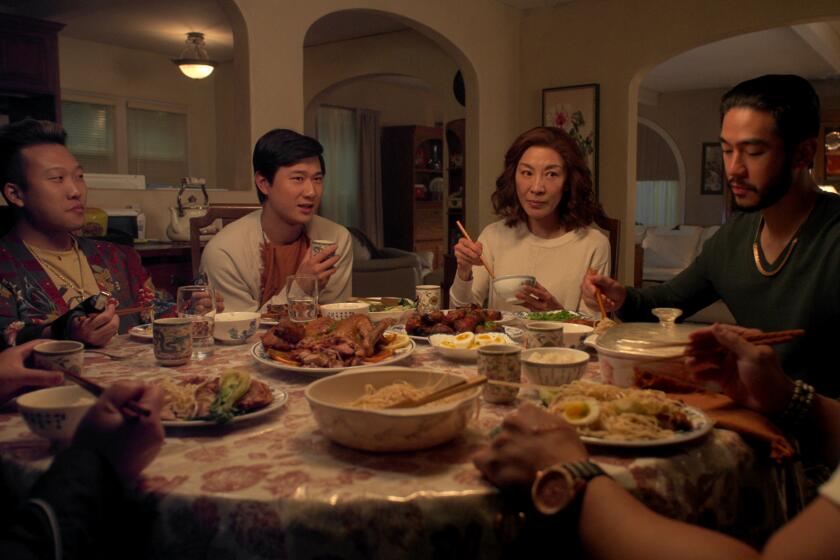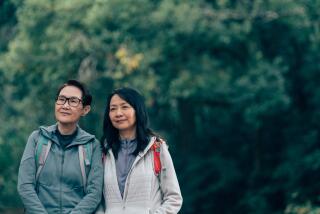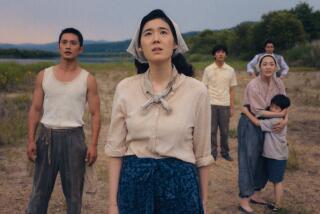Family drama and brutal fight scenes get equal footing in ‘The Brothers Sun’: ‘It’s a balancing act’
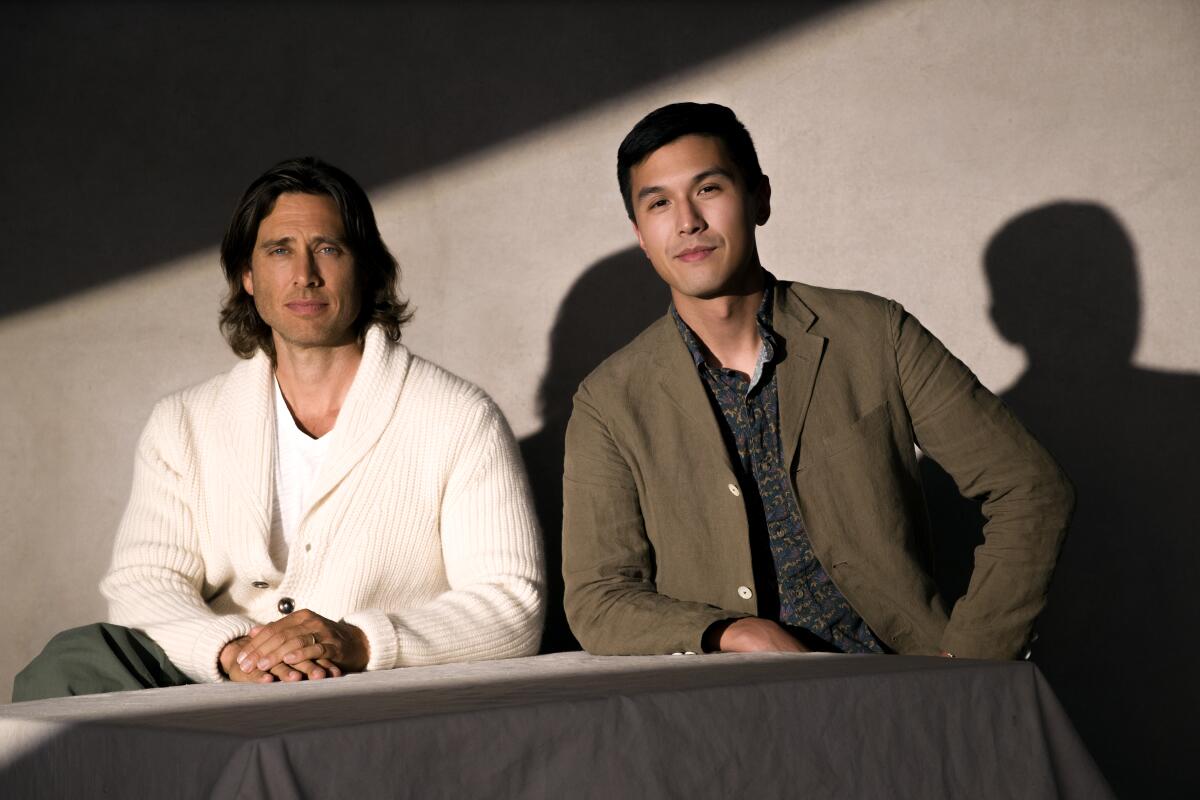
- Share via
Before graduate school, Byron Wu stuck to writing standard sitcom fare, thinking that was the path to work in Hollywood. But at the American Film Institute Conservatory, Wu — a fan of shows like “Get Shorty,” “Killing Eve” and genre-bending Asian films like Bong Joon Ho’s “Memories of Murder” — was encouraged to take more risks. He started writing “The Brothers Sun,” a show that veers sharply from action to family drama to comedy and back again. Co-created with Brad Falchuk, the series is now on Netflix.
“I wanted to see if I was capable of doing it,” Wu says, adding that he was fortunate to find a partner, and mentor, in Brad Falchuk, who co-created (with Ryan Murphy) “Glee,” “Pose” and “American Horror Story.” “Brad got what I was trying to do immediately, which was such a relief.”
Falchuk says shifting tones often make executives “freak out and say pick one” but that he loved Wu’s blend. And Falchuk’s presence also helped sell the series and nab a major star.
“What attracted me first was Brad’s name because I’ve been a big fan of his for the longest time,” says Michelle Yeoh, who plays the family matriarch on the show. “And I was particularly pleased that he’d chosen to champion a story about Asian immigrant families and a very exciting and dynamic one.”
The Oscar winner says she was also drawn to playing a mother who is worlds away from the ones she played in “Crazy Rich Asians” and “Everything Everywhere All At Once.” “I haven’t done a story quite like this and an episodic show gave me the arc of developing a character,” Yeoh says.
“The Brothers Sun” opens in Taipei with Charles Sun (Justin Chien) meticulously baking a dessert while “Great British Baking Show” plays on TV. Three assassins interrupt but he summarily dispatches them, upset only that he burned his creation during the slaughter. When his father, boss of Taiwan’s leading gang, is shot and nearly killed in the aftermath, Charles is sent to Los Angeles to protect his mother, Eileen (Yeoh), who moved to America with his brother, Bruce, 15 years earlier to escape the violence.
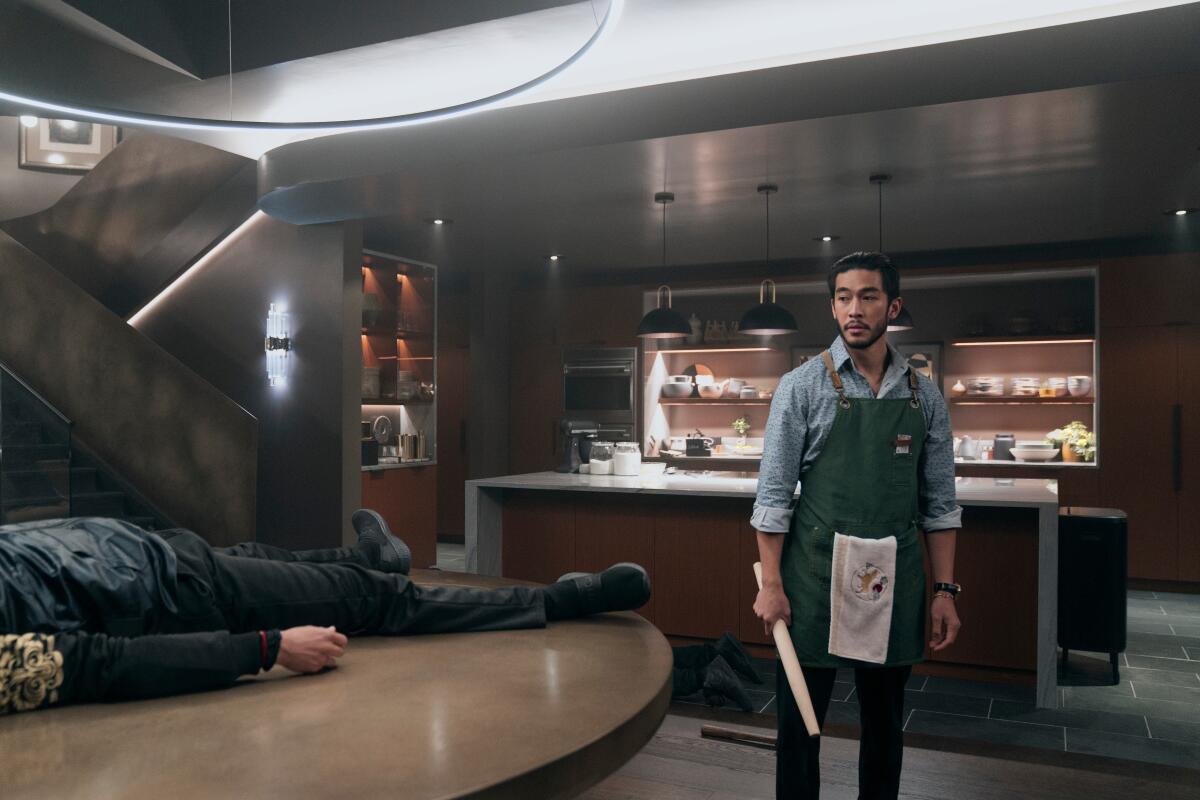
Eileen is perfectly capable of protecting herself, but Bruce (Sam Song Li), who aims to please his mom by studying to become a doctor but secretly aspires to have a career in improv, gets sucked into Charles’ orbit without the skills necessary to handle the whirlwind of guns, knives and martial arts that follow.
Action fans get what Yeoh calls “a lot of unapologetic violence” — stabbings, shoot outs and martial arts fight scenes galore. There’s even a severed head that Charles and Bruce tote around looking for information.
Falchuk says “action fans need to feel like they’re really seeing something, but for other viewers, we didn’t want things like an arm bending backwards and breaking or a bone sticking out, where they’d be totally grossed out. The show is supposed to be fun.”
‘The Brothers Sun’ runs out of narrative gas long before the finish line, but Michelle Yeoh makes it all go down easier as family matriarch Mama Eileen.
Eileen learns more than Charles simply by quizzing her gossipy mah-jongg partners, whose conversations easily shift from irritable bowel syndrome to leading drug dealers. Of course, Yeoh eventually flaunts her fighting skills but in the first few episodes, her stylistic contrast with Charles — who likes to kick first, stab second, then ask questions — is essential to the family drama. Eileen constantly chastises Charles but babies Bruce, not knowing until later that he has spent his school tuition on improv classes.
Much of the comedy derives from Bruce as a fish out of water in the world of gangsters — in one scene he tries to explain the difference between correlation and causation to save himself from being tortured, or at least from getting a penis tattooed on his face.
“It’s a balancing act,” Wu says.
The shifts in tone occur moment to moment. Falchuk points to the scene where Eileen comes home to find Charles, whom she hasn’t seen in 15 years, but also a fresh corpse, courtesy of another attack on Charles in the dining room. “We didn’t want to make it too saccharine,” he says.
“That’s a tough reunion but she says, ‘I’m going to cook for you,’” Falchuk explains. But they undercut that emotional moment when she says, “Fetch the good knife.” “The audience knows the good knife was just used to stab someone so she’s really telling Charles to clean it up so she can cook.” (Later she helps dismember the body for disposal.)
1
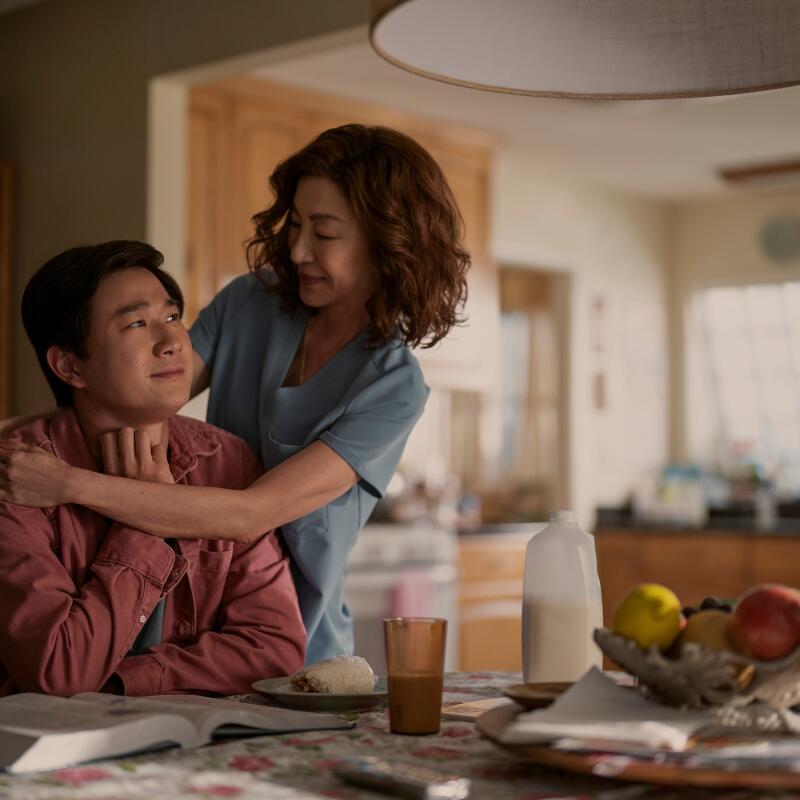
2
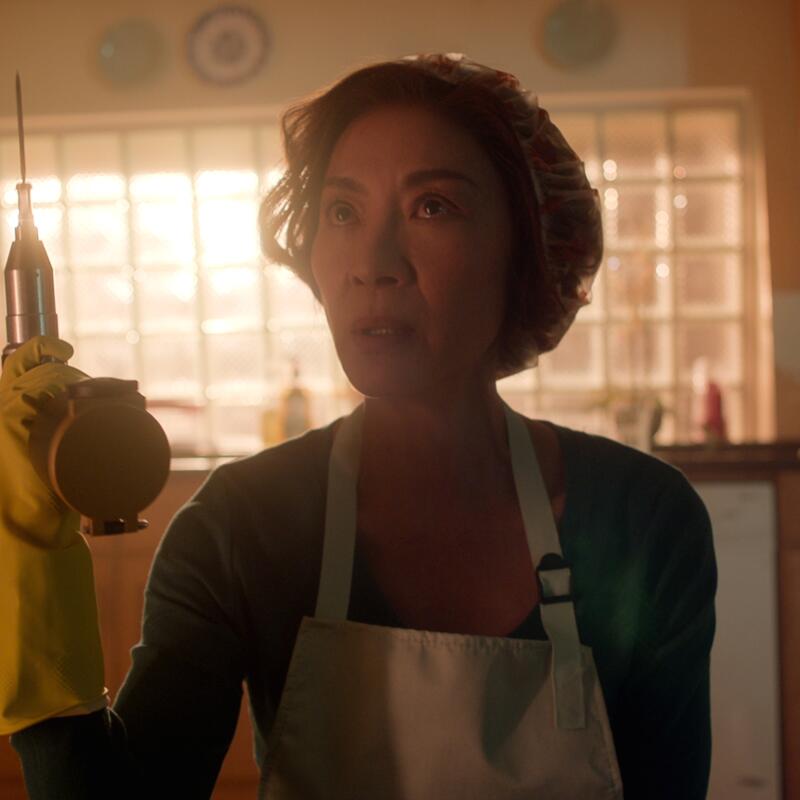
1. Bruce Sun (Sam Song Li), left, learns his mother is part of a Taiwanese underworld that brings his brother, Charles, to America after their father is attacked. (MICHAEL DESMOND/NETFLIX) 2. Michelle Yeoh stars as Eileen, who is living a quiet life in hiding in America. (COURTESY OF NETFLIX)
Yeoh had plenty of opinions about her character and story from the start. “Stars at Michelle’s level know what it takes and can have a lot of great notes focused on making this character special,” Falchuk says.
Yeoh praised the collaborative approach of Wu, Falchuk and Kevin Tancharoen, who directed five of the eight episodes. “I would question and prod and challenge them,” she says. “I did not want Eileen to be a stereotypical gangster mom and I knew the family dynamics had to be real even with all the body parts flying around,” Yeoh says.
She created a diary for her character, and with the three creators, built a detailed backstory for Eileen and her husband so Yeoh could understand the sacrifices Eileen has made. “You might not see it on the series, but you get hints of it and it was very important to me,” she says.
One of Yeoh’s suggestions was to have Eileen immediately criticize her son’s beard upon seeing him again. “She said, ‘That’s something my mom would have said,’” Falchuk recalls. “We said, ‘Say the line but don’t tell Justin we’re adding it.’ So he wasn’t expecting it and his reaction in the moment was real.”
Song Li, who like Bruce was raised in the San Gabriel Valley by a single mom who wasn’t thrilled with his showbiz aspirations, says the creators constantly “threw curveballs.” In a scene where Bruce is held hostage, he thought Tancharoen was doing a wide shot but “Kevin told one of the henchmen to shove the fake Glock into my balls. And he filmed my reaction in close-up.”
That quest for authenticity went far beyond those moments of planned spontaneity. “If our food stylist or on-set interpreter or anyone in the crew felt something wasn’t quite right, they were encouraged to speak up to make things authentic,” Wu says, adding that he’s especially proud of populating not just the cast, but the director’s chair, department heads and writers room with Asians and Asian Americans. “That’s been the most rewarding part. We’re here and we’re so capable and everyone got to show themselves on this show.”
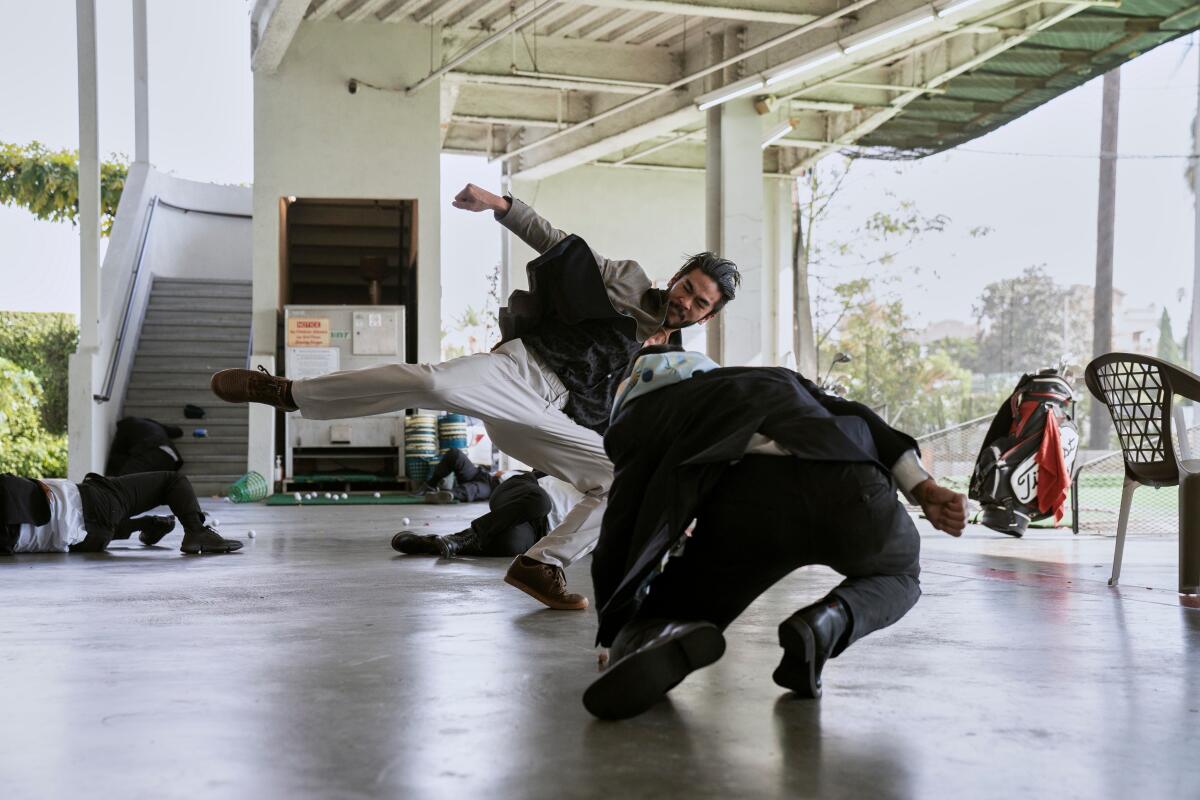
Chien brought his background in martial arts — he practices Muay Thai and jujitsu — to Charles but adds that while he spoke some Mandarin, he strived to elevate his language skills for the show. “I think in English, so I worked really hard on my Mandarin,” he says, adding that he continues polishing it in anticipation of a second season.
The final ingredient was an emphasis on food, one that goes beyond Charles’ passion for baking (in Los Angeles he becomes obsessed with churros), to include numerous scenes of the cooking and sharing of meals.
“In the writers room, we all felt we needed the food scenes because it’s important to us; it’s how our families get together,” Wu says. “No authentic Asian American show could feel complete without that.”
More to Read
The complete guide to home viewing
Get Screen Gab for everything about the TV shows and streaming movies everyone’s talking about.
You may occasionally receive promotional content from the Los Angeles Times.
